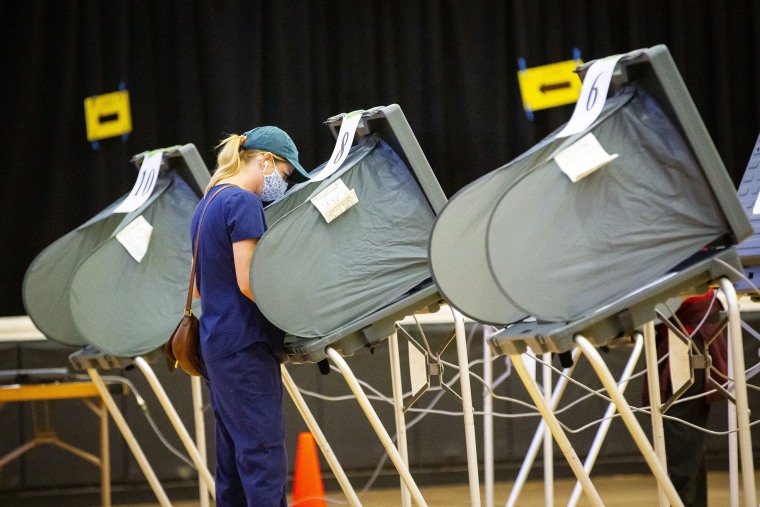HOUSTON — As polls closed in Texas on Tuesday night, dozens of young liberals crowded onto the patio of a bar in Houston’s eclectic Midtown neighborhood, hoping to see history.
For weeks, polls showed an unusually tight presidential race in Texas, raising the possibility that former Vice President Joe Biden might become the first Democrat to win the state since 1976. At Axelrad Beer Garden, voters said they saw the record-setting turnout in left-leaning Harris County as a reason for hope.
“I’m trying not to set my expectations high, so if somehow we flip that will be an exciting surprise,” Serma Malik, 36, said.
Then the results started coming in, and the hope faded.
Shortly after the bar closed at midnight, President Donald Trump was named the projected winner in Texas, making one thing clear: Even though Democrats spent tens of millions of dollars here, Republicans still dominate the Lone Star State.
“I think that if the Democrats are doing an objective post-election analysis, they will see that they had a very low return on investment, considering the tens of millions of dollars that flowed into Texas, to quote-unquote, ‘flip Texas,’” Texas GOP Chairman Allen West said in an interview on Wednesday morning. “I don't think that anyone's going to want to write a lot of checks into Texas for Democrats, when they saw such a flop yesterday.”
With 96 percent of votes counted in Texas, Trump had a 6-point lead over Biden in the state. That margin is closer than Trump’s 9-point victory over Hillary Clinton here four years earlier, but far short of the expectations set by Democrats. The party also fell well short of its goal of flipping several Texas congressional seats and taking control of the state House.
“A lot of things didn't materialize for Democrats that they hoped would,” Brandon Rottinghaus, a political scientist at the University of Houston, said. “The Latino vote wasn't as sizable as they needed, and it didn't break for Biden in as big of numbers as hoped. The suburban vote didn't track the way that the Democrats had wanted, or the way the polls were showing things going.
“The million-dollar question is, ‘Why?’”
One big factor, Rottinghaus said: Democrats hoped to make big gains with conservative-leaning suburban voters who may have been disillusioned by Trump’s handling of the coronavirus pandemic. But many of those voters were focused on other issues, such as the economy and abortion, according to the NBC News Exit Poll of early and Election Day voters.

More than a third of Texas voters said the economy was the most important issue, and among them, 83 percent reported voting for Trump. Trump won by an even bigger share of the 45 percent of Texas voters who said abortion should be illegal in all or most cases.
“In the end, we still saw Texas operating under the three Gs: God, guns and gas,” Rottinghaus said. “I think that the fear among many voters was that Joe Biden and the Democrats largely were going to push the state too far left.”
As has become something of an election night tradition in Texas, Democrats licked their wounds and pointed to the future.
“With every election, we're getting one step closer to that change,” Ed Espinoza, the executive director of Progress Texas, told reporters.
“The work we did will move our state forward for years to come,” Democratic Senate candidate M.J. Hegar said in a written statement after losing by 10 points to Republican Sen. John Cornyn.
It’s true that Texas Democrats have come a long way over the past two decades, said Victoria DeFrancesco Soto, a political scientist and an assistant dean at the LBJ School of Public Affairs at the University of Texas at Austin. This was the closest presidential contest here in decades, in a state that Republican Mitt Romney won by 16 points just eight years ago. And, DeFrancesco Soto said, the party continued to make gains in the state’s rapidly diversifying metro areas.
“I see the ball moving forward for Democrats, even if they fell short of expectations,” she said.

If there’s a lesson Democrats can take from this election, she said, it’s that they have a lot of work to do with Latino voters along the Mexico border, especially in the Rio Grande Valley, where Trump won significantly more votes compared with 2016.
Democrats cannot simply take Latino voters for granted in Texas, she said.
“Democrats, perhaps because of the pandemic and because of the public health concerns, weren't aggressively on the ground doing old-school, grassroots outreach,” DeFrancesco Soto said. “Compare that to Republicans who were. And this matters because I am a big believer that shoe-leather politics matters, but it especially matters for Latinos.”
But even if Biden had won Latinos at the same margin as Clinton did four years ago, it would not have been enough to offset the huge advantage Republicans hold in Texas’ vast rural and predominantly white communities.
Two days before the election, Texas Gov. Greg Abbott tweeted his reaction to a national news story suggesting Texas could flip for Biden: “Democrats’ dreams will be crushed again,” the Republican wrote.
On Tuesday night, the governor logged in to announce that he’d been right.
In conclusion, Abbott tweeted, “God bless Texas.”


